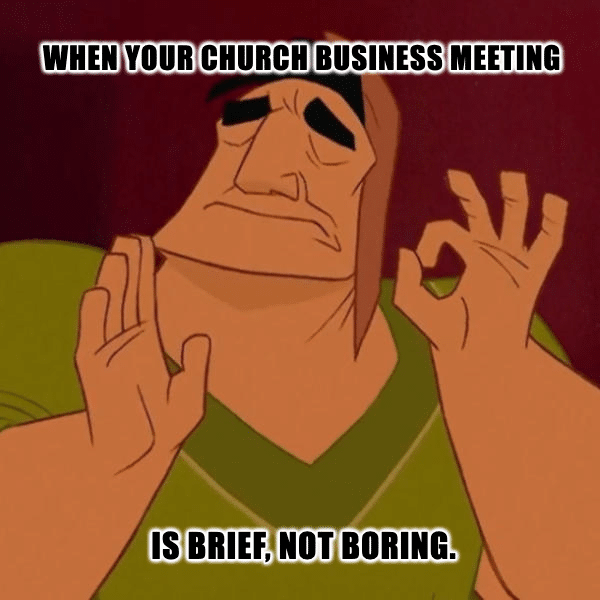

You know how in the Peanuts comic strip, Peppermint Patty falls asleep in class while her teacher drones on and on? I've sat through countless church business meetings that drone on and one, just like that:
Ugh. horrid, painful things! In all honesty, during my 20+ years of leadership experience, I've LED some of those meetings. Why are they so terrible? Because too often, attendees arrive at church business meetings with different expectations and priorities. As a result, we spend more time in conflict than we do in conversation.
Everything changed, though, once we instituted this key rule: no meeting without an agenda. After that, meetings improved (aided in no small part by our church management software) and became a vital part of our church management toolbox!
The number one thing you need to keep meetings as brief as necessary is a well-crafted agenda.
Joshua Gordon

An effective meeting agenda gives everyone a voice, keeps tangents to a minimum, and clarifies your goals. This article will can you everything you need to achieve THAT. Here’s what’s coming up:
A church business meeting is a gathering where attendees discuss and make decisions about the church's activities, finances, and future plans.
Too often, we see these meetings as a "necessary evil." But that is a grim interpretation of the situation. An honest moment here: it's just a bad attitude to have. Every meeting can be an opportunity to move the needle forward on the missions of the church and of Jesus.
In fact, with this working definition, we can say whether or not these meetings truly have purpose and value. If they don't, then you have a set clear criteria to justify disbanding or re-purposing these meetings.
Every church meeting needs a facilitator who creates the church business meeting agenda. In many churches, the lead pastor is responsible for ensuring these meetings run smoothly.
What if that isn't your gift, though? After all, not every leader is an administrator. It's actually fairly simple. A church business meeting agenda that works well defines the goals for the meeting. You can't go wrong listing those decisions.
Even if you're not administratively minded, t his simple approach c an improve your church business management abilities.
Every agenda should be concerned with:
If a meeting agenda can accomplish all of this, then every church meeting can have value and advance the church's goals. Be sure to file your meeting agenda away. Don't toss it. They are a valuable part of your church record management strategy.
Join our Newsletter
Sign up for regular insights on how to pastor and lead better.
Each agenda needs to state who should be at the meeting. The people who are coming to the meeting (and the church leadership role they hold) will largely determine what gets discussed, the types of conversation that can be expected, and, to some degree, what politics may be at play (and need to be avoided).
Every meeting needs to have a layout that addresses who will be talking and what they will be talking about.
This section will be customized based on the type of meeting and who will be attending. Getting this order right and making sure each member can share what they need to say will go a long way to ensuring every member feels seen and heard.
A great practice to keep these discussions orderly is to allow a set amount of time per item. This keeps everyone hyper-focused on what they need to say to communicate their points effectively.
From there, you can allow for a set amount of time for others to ask and answer questions. At the end of the time, the group needs to make a decision on the item. If no decision can be made right away or there is a bigger discussion to be had, then set that item as a priority for the next meeting.
Much like church business meetings need the streamlining structure of a well-crafted agenda, church management strategies need the robust structure of a best-in-class church management software tool. These are our top picks. Each tool on this list has been thoroughly vetted by my team and I.